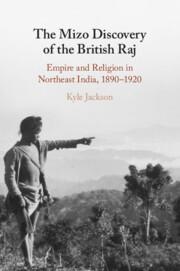Book contents
- The Mizo Discovery of the British Raj
- Additional material
- The Mizo Discovery of the British Raj
- Copyright page
- Dedication
- Contents
- Figures
- Maps
- Abbreviations
- Introduction
- 1 Coming into View
- 2 Reading the Forest
- 3 Adopting the Missionary
- 4 Sensing the Mission
- 5 Crisis and Conversion
- 6 Conclusion
- Glossary
- Bibliography
- Acknowledgements
- Index
2 - Reading the Forest
Roads, Animals, Converts (1891–1912)
Published online by Cambridge University Press: 12 October 2023
- The Mizo Discovery of the British Raj
- Additional material
- The Mizo Discovery of the British Raj
- Copyright page
- Dedication
- Contents
- Figures
- Maps
- Abbreviations
- Introduction
- 1 Coming into View
- 2 Reading the Forest
- 3 Adopting the Missionary
- 4 Sensing the Mission
- 5 Crisis and Conversion
- 6 Conclusion
- Glossary
- Bibliography
- Acknowledgements
- Index
Summary
So far, Christianity in Mizoram has been understood as having a specific birthdate: 11 January 1894, the day two Christian missionaries from London carried the world religion - along with technologies of writing, education, and print media - into the foothills. Despite the centrality of forest animals and spirits to everyday life in the past, the roles of forest-dwellers in this story have drawn little more than a cursory glance in historical writings. This chapter paints a different picture. The story of the Christianization can be seen afresh by paying attention to both continuity and change in older human relationships with the forest as well as by taking seriously both vernacular sources and the environmental knowledge of uplanders. Ecological transformations and catastrophic collapses in animal populations attended the arrival of the colonial state in the late nineteenth century, alongside the mass ‘vermin’ eradication schemes of the early 1900s. The changes wrought during this period altered the most historically significant of human relationships in the Lushai Hills - those with other animals, plants, and non-human beings. In this complicated ecosystem, these shifts both shaped and mirrored changes in upland society towards modern institutions: a cash economy, state rule, missionary and state medicine, and, most importantly, the near total conversion of the human population to Christianity from the early to mid-twentieth century. It was through the actions and reactions of specific forest species, and through changing human relations with them, that Christian missionaries first become relevant to upland people.
Keywords
- Type
- Chapter
- Information
- The Mizo Discovery of the British RajEmpire and Religion in Northeast India, 1890–1920, pp. 57 - 103Publisher: Cambridge University PressPrint publication year: 2023

